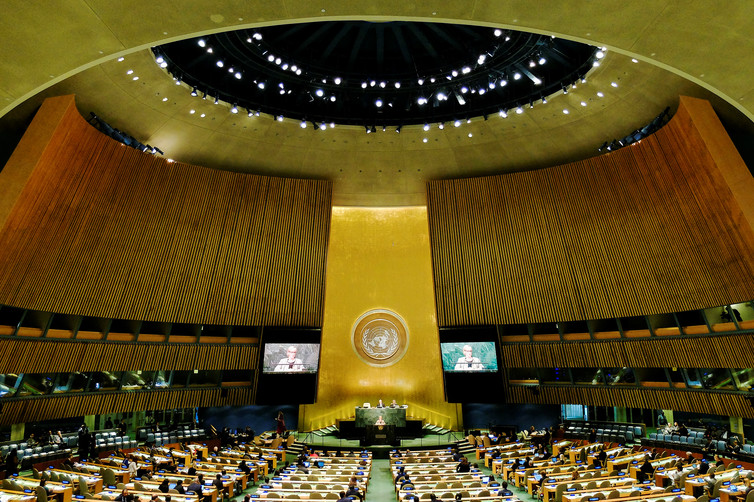
Amid political turmoil in Pakistan – where the public is chanting “GO Nawaz Go” while dreaming of so-called revolution – Prime Minister Nawaz Sharif’s speech at the 69th session of the UN General Assembly proved to be a soothing factor in domestic affairs. The Prime Minister’s leadership has been brutally criticized by the mainstream political figure Imran Khan and a Canadian returned religious cleric, Tahir-ul-Qadri, since August 14, 2014. It seems as though PM Nawaz Sharif saw this opportunity as a blessing to address the international community on matters of high concern and to show internal political forces “that Go Nawaz Go functioned as buck up.” While Indian media seems unhappy over the highlighting of the Kashmir issue, Pakistani media is praising it.
The Prime Minister called for the resumption of talks and promotion of trade, along with settling territorial disputes which are hindering the way to peace and stability in the region. I think it was high time and the right venue to remind international community and United Nation about their responsible role to resolve Kashmir issue as promised. Solving the Kashmir issue would be equal to saving millions of innocent human beings vulnerable to barrels and bombs. Just imagine for a while, how 43,632 human beings were killed during 1988-2014 in the name of peace and security? The grave situation of human rights violations recorded by some human rights organizations from 1990 to 1999 reveals those nearly 4,242 women between the ages of 7-70 that have been raped.
I would say that solving the Kashmir issue would be a blessing for Kashmiris and bonus for India and Pakistan. Though they talk about peace, these nuclear neighbors violated the Line of Control around 200 times during 2013 and it is likely to remain the same in 2014. It bangs when one recalls the extraordinary regional realities for instance: Nuclear Weapons, Kargil episode, Cold Start Doctrine, Tactical Nuclear Weapons, Escalation probability and cost in case of any accident would be unimaginably high. In the meanwhile, I just spotted news of cross-border shelling at the LoC resulting in 9 civilian deaths and 25 injured.
The Prime Minister also touched on nuclear issues in the speech, stating that Pakistan is a responsible nuclear state and has improved its nuclear safety and security mechanism a great deal. Reference to this statement is the NTI report that crowned Pakistan as “most improved” nuclear weapon state among nine nuclear weapons states – though it was ranked 22nd overall – at safeguarding its nuclear materials. Pakistan earned the points on the basis of improvements in three areas: physical protection of weapons and material both at facilities and during transportation, regulations and licensing, and on-site security reviews. Likewise, Army Chief General Raheel Sharif showed satisfaction over the safety and security of the nuclear arsenal and facilities. ISPR also endorsed that “Pakistan’s nuclear programme was of central importance to the country’s defence programme and a robust nuclear command and control structure is in place.”
Another important aspect of the Prime Minister’s speech was the maintenance of “Credible Nuclear Deterrence” in the region. The political leadership in Islamabad is firm in supporting the global agenda of “Nuclear Disarmament and Nonproliferation” and discouraging the regional arms race. Though a not a member of the Nonproliferation Treaty (NPT), a sense of responsibility has pushed Pakistan to adhere to the global spirit of export control regimes. The call for a place in global nonproliferation regimes would be a reward for Pakistan in return for her consistency in pursuit of excellence in nuclear safety and security. Additionally, Pakistan’s acute energy crisis will naturally promote and support the idea of exploration of civilian nuclear options to overcome the energy deficit. So a civilian nuclear deal is a real need of the time for Pakistan. The reservations over dual-use and diversion could be dealt with the help of IAEA and export control regimes.

As India’s influence grows, potential memberships in two organizations – the United Nations Security Council (UNSC) and the Nuclear Suppliers Group (NSG) – concern political leadership in Pakistan. It would be relevant to note that the NSG was formed in response to India’s Peaceful Nuclear Explosion (PNE) in 1974 to stop and monitor such dual-use and diversions in future. Equally, India is denying the right of self-determination of Kashmiris and UNSC resolutions, and it is being considered as likely permanent member of UNSC. India is a bigger power comparatively, aspiring for regional domination and her struggle for positions in UNSC & NSG are a sovereign right of India. But – these moves also may cause a rippling effect in the regional balance of power.
I would say that PM speech was the only positive deed appraised by the Pakistanis since the Dharna (Sit-in) started. He sensibly attempted to counter the Azadi March and India’s UNSC & NSG positions at the same time by voicing the Kashmir issue – bidding for a more resilient political position. To conclude, regional security dynamics encourage the idea of cooperative security initiatives to deal with areas like territorial disputes, water crises, and conventional and nuclear stockpiles – using innovative Confidence Building Measures (CBMs). The sole idea behind such CBMs should be the promotion of peace and stability in the region. Tripartite dialogue may unearth new horizons of cooperation to resolve the Kashmir issue acceptable to stakeholders. Both states must avoid “ifs” and “buts” and step up and open doors for negotiations as only dialogue may lead to peace in the region.
***
Image 1: Sean Gallup-Getty Images News, Getty